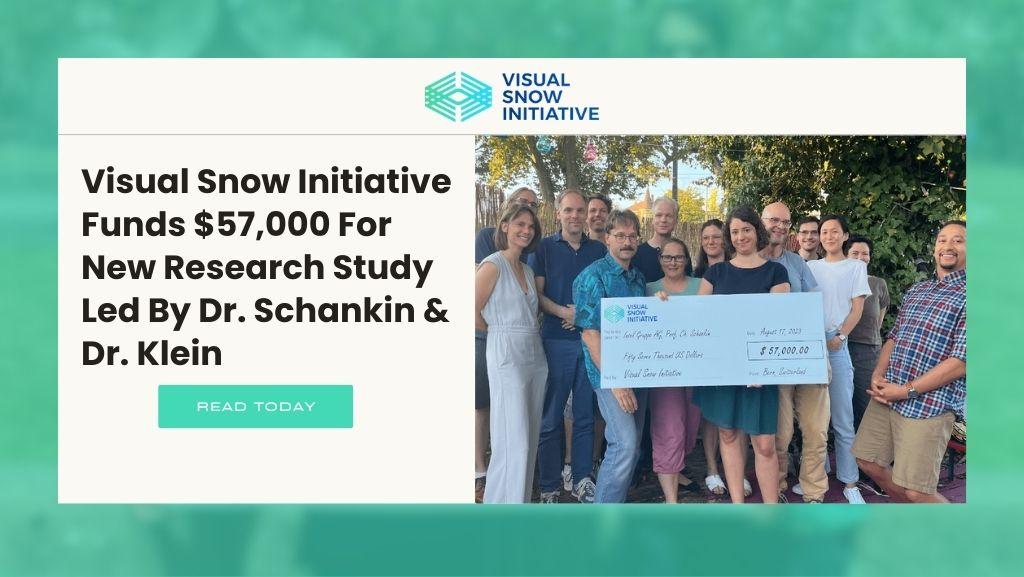The Visual Snow Initiative recently announced its funding of multiple studies aimed at investigating Visual Snow Syndrome (VSS), specifically the biological basis of the condition, its pathophysiology, and exploration into the efficacy of various types of potential treatments. Among these studies is Dr. Christoph Schankin and Dr. Antonia Klein’s VSS neuromodulation research study at Inselspital, Bern University Hospital, Switzerland. They are currently seeking volunteers for this study. Details about the study, participation, and more can be found below.
Study Title
“EEG-Signature of Visual Snow Syndrome and evaluation of a targeted treatment approach with transcranial alternating currents stimulation (tACS)”
Principal Investigators
Prof. & Dr. med. Christoph Schankin and Antonia Klein, MD
Department of Neurology
Inselspital, Bern University Hospital
University of Bern
Freiburgstrasse
CH-3010 Bern
Purpose
This study aims to reduce VSS symptoms (i.e. visual snow/static, palinopsia, entoptic phenomena, photophobia, and nyctalopia) using transcranial alternating currents stimulation (tACS).
Project Description
1. Identify the target for tACS using EEGs from patients
Dr. Schankin and Dr. Klein already have these EEGs and are currently comparing those to the EEGs of patients without VSS. They are utilizing methods that have been established successfully for similar conditions, such as tinnitus, chronic pain, and depression.
2. Finalize the ethics application for the stimulation study (to investigate if tACS is able to reduce symptoms of patients with VSS)
3. Perform treatment study (incl. additional studies to understand the effect of tACS)
For this main study, Dr. Schankin and Dr. Klein aim at investigating VSS using the target
identified in step #1. This is a standard approach using a protocol that has been
successful in treating tinnitus and chronic pain conditions.
They have also noted that one significant advantage of tACS (compared to other neuromodulatory treatment approaches) is that it can be gradually adapted during stimulation according to the feedback of the patients.
Furthermore, they will do MRI and simultaneous EEG to better understand visual processing, e.g. by investigating the threshold for photophobia and comparing this to thresholds for sensory or auditory signals that are typically not affected in VSS. This will be important for understanding the results of
their stimulation study.
This study will be performed at NeuroTec. This research facility is located at the
Department of Neurology, Inselspital and provides high quality research equipment, including imaging, EEG, and neuromodulation.
In order to recruit optimal VSS patients, support for transportation and accommodation expenses will be provided. This factor is not present for control subjects, who will be identified from the local area. However, controls will have to be compensated for their loss of time, travel expense, and inconvenience.
4. Analysis of results and communication
This study is actively ongoing. Dr. Schankin and Dr. Klein estimate their study will be completed by the end of 2024.
Funding
Visual Snow Initiative
Other sources
For this study, Antonia Klein, MD was granted protected research time by the Gottfried and Julia Bangerter-Rhyner Foundation and SAMS Young Talents in Clinical Research (YTCR) funding program.
Study Participation
Dr. Christoph Schankin and Dr. Antonia Klein are seeking volunteers for their new VSS Study, “EEG-Signature of Visual Snow Syndrome and evaluation of a targeted treatment approach
with transcranial alternating currents stimulation (tACS)”.
Details:
- Researchers will aim to reduce VSS symptoms (i.e. visual snow, palinopsia, entoptic
phenomena, photophobia, and nyctalopia) using tACS - Anyone with VSS can participate, but must be able to travel to Switzerland
- Study will take place in-person at the University Hospital of Bern, Switzerland
- Involves 5-day participation with a total of 9 sessions
- Following completion, participants will have a follow-up appointment (typically conducted by telephone after 1 week and another after 4 weeks)
- Anticipated completion of study, according to researchers: end of 2024
If you are interested in participating in this study, please email:
More Information
Stay tuned for further updates regarding this VSS research project and more via our website, newsletter, and social media channels. Your support ensures that global VSS research can continue. Together, we can help individuals who are impacted by VSS. Thank you.


